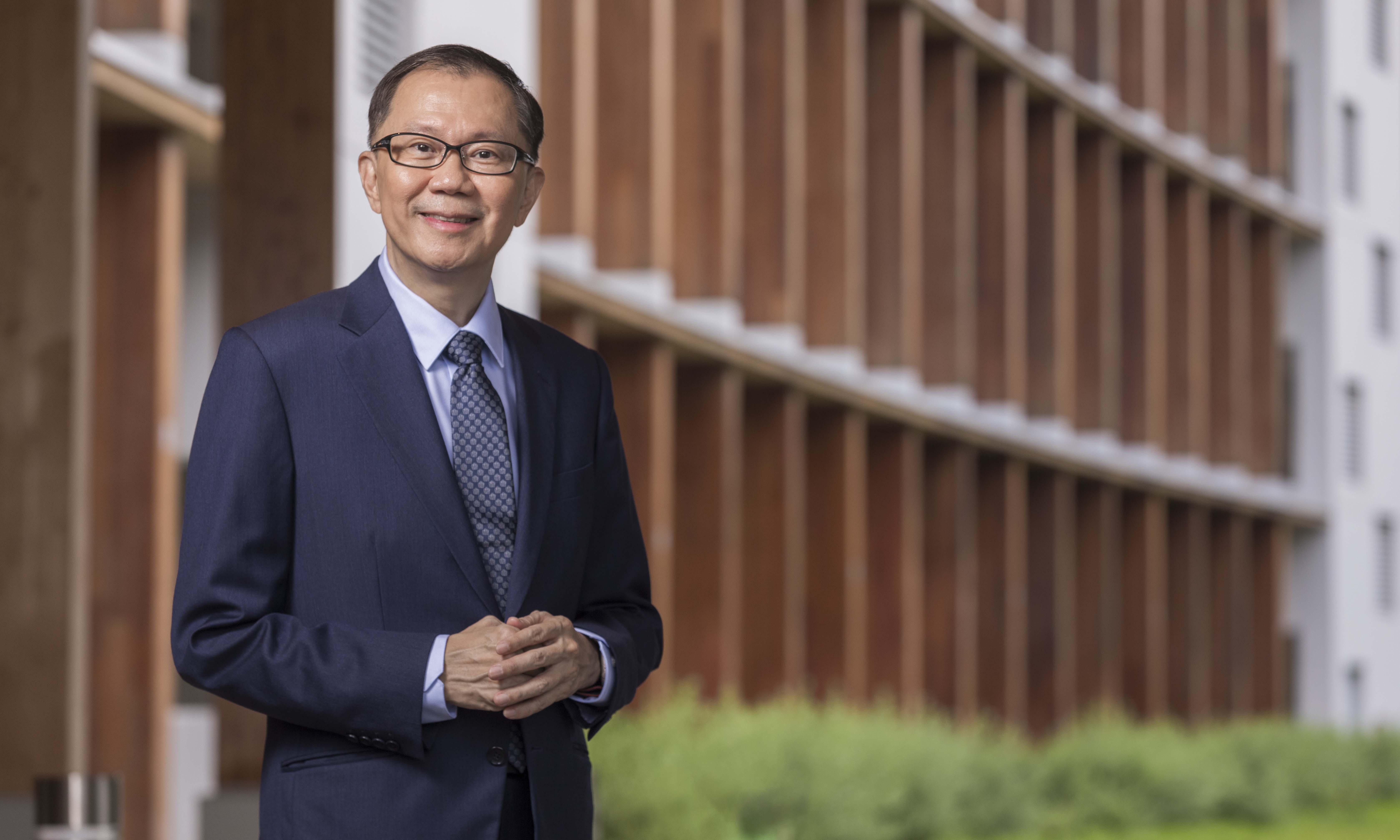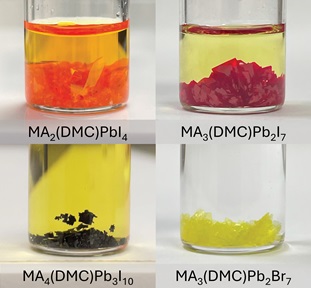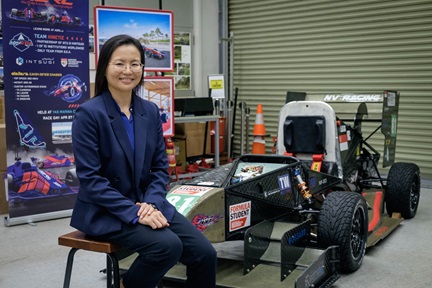Purposeful innovation
NTU’s new President, Prof Ho Teck Hua, shares how NTU is fuelling translational research to solve industry pain points and push knowledge frontiers.
 Research builds new knowledge that advances society and addresses some of its most pertinent issues. Applying knowledge from research to tackle humanity’s greatest challenges is a key aspect of NTU’s mission as a global, research intensive university founded on science and technology.
Research builds new knowledge that advances society and addresses some of its most pertinent issues. Applying knowledge from research to tackle humanity’s greatest challenges is a key aspect of NTU’s mission as a global, research intensive university founded on science and technology.
The University needs a systematic way to encourage such research, as well as strike a balance between discovering new knowledge and finding practical applications, says NTU President Prof Ho Teck Hua.
Prof Ho was appointed as the University’s fifth President in April 2023 and also honoured as a Distinguished University Professor, the highest academic honour bestowed on eminent NTU faculty members with extraordinary scholarly achievement.
An acclaimed expert in behavioural economics, data science and management science, he is also the Founding Executive Chairman of AI Singapore, a national research and development programme, and President of the Academy of Engineering, Singapore.
In this interview, Prof Ho outlines NTU’s vision for translational research and why ideas are its most valuable assets.
Q: Why is translational research important to the University?
A: Research translation is in our DNA. NTU is, by design, a practical and technological university that creates solutions to change the world.
We began by producing practising engineers. Now, we’re producing not only graduates in many disciplines but also ideas that make a difference.
This is integral to our vision and mission to be a great global university founded on science and technology that nurtures leaders and creates societal impact through interdisciplinary education and research.
Q: How is translational research crucial for Singapore?
A: For small countries like Singapore, research translation is important because our enterprise ecosystem is not as vibrant as that in larger countries. We don’t have as many big companies capable of turning research into innovations, so we must figure out a more systematic and purposeful way.
Through translational research, there is economic impact when companies use our research to create products, jobs and exports for Singapore. Besides financial returns, translational research can also improve life in other ways, such as helping us find answers in the fight against pandemics and enabling people to be healthier.
Q: How is the University encouraging research translation?
A: We fuel research translation to create societal impact in four ways. First, we work with world-class industry partners on research, including companies as diverse as Rolls-Royce and HP. They tell us their pain points, and we address them by providing technical expertise as well as new and relevant research ideas. So, our research serves as an economic engine that helps businesses develop better products and solutions.
We now have over 250 industry partners and about 20 corporate laboratories and joint laboratories with industry on research.
Second, we conduct research that we believe will be useful to the world, and license intellectual property (IP) from our research to companies. Businesses can then use the IP to improve their goods and services and address problems they face.
We have over 5,000 invention and technology disclosures from the past 14 years. Among these, about 20% of the technologies have been licensed.
The University’s third approach to research translation is to cultivate our own startup ecosystem, where we support the creation of enterprises that tap into our IP to develop products and services for a global market.
In the past decade, we have incubated 70 companies spun out from NTU’s research, from biomedical innovations to water treatment solutions. Several spinoffs have been publicly listed or acquired too.
For instance, CelePixel, which designs high-speed imaging sensors for autonomous electric vehicles and robots, was spun out from NTU in 2016 and acquired by OmniVision for S$100 million (US$134 million) in 2019.
Lastly, we build on NTU’s contingent research capabilities that can be leveraged to find solutions during crises such as the COVID-19 pandemic. To develop these capabilities, we support our researchers in honing their skills and expertise through challenging research problems.
Q: What is NTU doing to improve its work with industry partners and licensing its research IP?
A: For our industry collaborations, we want to improve the quality of the research projects done with our partners to address not only their immediate and short-term problems, but also their longerterm and more ambitious challenges.
Besides just applying our research knowledge to solve issues, we strive to make new discoveries and push the knowledge frontier at the same time – achieving a balance between the two is important.
To facilitate the licensing of NTU’s research, we are simplifying our IP framework and making the IP application process easier for companies by dramatically cutting application times from months to weeks.
This will be done through a common online IP platform that we’re developing with the National University of Singapore (NUS). The platform is part of a recently launched S$75 million (US$56 million) programme by NTU, NUS and Singapore’s global investment company, Temasek.
Under the new platform, IP licensing fees will also be deferred to lower barriers to encourage companies to experiment with our IP for free. They pay licensing fees only after they start making a certain amount of revenue.
Additionally, we want to better promote NTU’s IP, so that more organisations can tap on our ideas to deal with their pain points.
In the coming year, we are developing a systematic way to group relevant IP together and market it as a bundle, while also offering consulting services to guide companies in translating the IP.
Our goal is to increase the proportion of technologies we license from one in five now to one in two in the future.
Q: How does NTU intend to grow its startup ecosystem and foster unicorn companies?
A: Every year, we invest in 15 deeptech startups spun out from the University’s research on significant scientific advances or engineering innovations. So far, we have one unicorn (a private startup valued at over S$1.34 billion or US$1 billion), the nanotechnology solutions company Nanofilm Technologies International.
We have an ambitious plan to double the number of NTU deep-tech spinoffs from 15 to 30 annually by 2026. Through careful curation and support, we hope to increase the probability of producing unicorns.
Three ingredients are necessary to foster the birth of the next unicorn: technical expertise, venture building experience and funding. The recent S$75 million (US$56 million) programme launched by Temasek, NTU and NUS aims to bring these factors together and accelerate the creation of successful deep-tech startups from research at NTU and NUS.
The initiative will focus on companies possessing technologies with the potential to address large problems in a market that is worth over S$50 billion (US$37 billion).
NTU and NUS will provide “experts on demand” to help companies overcome technical barriers in bringing these technologies to market.
Temasek will offer venture building guidance and provide managerial talent to run startups. For instance, the chief executive officer of the NTU spinoff Amperesand, whose technology could enable more efficient charging of electric vehicles, was brought in with Temasek’s help.
Joint funding from Temasek, NTU and NUS will also support the startups financially.
Q: Why is it important for the University to build contingent research capabilities?
A: Recent advancements in generative artificial intelligence (AI) include chatbots like ChatGPT that are poised to fundamentally change the way we learn and interact with machines, as they make a huge wealth of knowledge accessible to us.
However, AI chatbots are influenced by biases in the data fed to them. This makes them less effective at making sense of cultural norms and nuances that they are not trained on, such as language varieties unique to specific countries.
NTU can leverage its strong contingent capabilities in AI research to develop generative AI innovations tailored to languages used in Southeast Asia.
This would not be possible if the University did not already have such research competencies on hand.
Other up-and-coming, game-changing fields where NTU has demonstrable prowess are photonics and quantum science.
Our Photonics Institute is a world-class centre in photonics technology research. The University’s Quantum Science and Engineering Centre is also the first of its kind in Singapore, developing devices and technologies powered by quantum science and training skilled talent for quantum engineering.
We will continue to explore emerging contingent capabilities on which to build our strengths.
Q: How does NTU balance the pursuit of intellectual curiosity and research commercialisation?
A: NTU always focuses on research with high intellectual value. Within this category, we have research with high intellectual value and high translational value (applied research), and research with high intellectual value and uncertain translational value (curiosity-driven research).
Applied research can lead to immediate impactful outcomes for society.
Curiosity-driven research advances our understanding of the world, even if its applications and translational value may not be apparent yet. We believe in striking a balance between applied research and curiosity-driven research at the University.
Q: What skills and mindset should a researcher have, and how can NTU attract the best research talent?
A: We want our researchers to embrace a culture of pursuing research that tackles the biggest, most difficult and most intellectually challenging problems.
Researchers should stay curious about their fields of study while addressing the biggest limitations that the world faces, such as land scarcity issues and bottlenecks in human productivity.
They should strive to come up with solutions to challenging problems and push the frontiers of human development in meaningful ways.
To produce outstanding results from research, NTU must continue to nurture an open, creative and encouraging environment that empowers our researchers. Our infrastructure, resources, shared facilities and mentorship from colleagues are also crucial to supporting our researchers in their endeavours.
The article appeared first in NTU's research and innovation magazine Pushing Frontiers (issue #23, March 2024).




.tmb-listing.jpg?Culture=en&sfvrsn=29c7e020_1)
.tmb-listing.jpg?Culture=en&sfvrsn=55153609_1)

